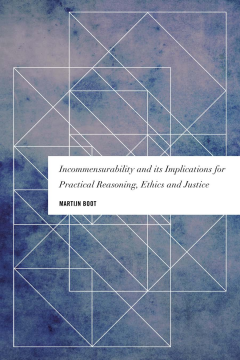
BOOK
Incommensurability and its Implications for Practical Reasoning, Ethics and Justice
(2017)
Additional Information
Book Details
Abstract
If values conflict and rival human interests clash we often have to weigh them against each other. However, under particular conditions incommensurability prevents the assignment of determinable and impartial weights. In those cases an objective balance does not exist.
The original thesis of this book sheds new light on aspects of incommensurability and its implications for public decision-making, ethics and justice. Martijn Boot analyzes a number of previously ignored or unrecognized concepts, such as ‘incomplete comparability’, ‘incompletely justified choice’, ‘indeterminateness’ and ‘ethical deficit’ – concepts that are essential for comprehending problems of incommensurability.
Apart from problematic implications, incommensurability has also favourable consequences. It creates room for autonomous rational choices that are not dictated by reason. Besides, insight into incommensurability promotes recognition of different possible rankings of universally valid but sometimes conflicting human values.
This book avoids unnecessary technical language and is accessible not only for specialists but for a large audience of philosophers, ethicists, political theorists, economists, lawyers and interested persons without specialized knowledge.
Martijn Boot is an Assistant Professor at University College Groningen, the University of Groningen, the Netherlands.
This book is a rigorous treatment of a major question: Can there be rational decisions between options having incommensurable values? Challenging the view that incommensurability does not preclude rational choice, Boot details obstacles to choices between incommensurables and indicates how practical reasoning should accommodate them. In doing this he says much of value about justice, healthcare, punishment, and other major topics.
Robert Audi, John A. O'Brien Professor of Philosophy, University of Notre Dame
It is hard to think of a more important practical question than whether there are irresoluble conflicts between values. Philosophers in recent years have made major advances in clarifying that question and developing answers to it, but their work is often technical. Martijn Boot is technically adept, but in this highly significant book makes his arguments in clear and engaging prose. He brings out the implications of incommensurability in various areas, as well as taking the debate forward on several fronts.
Roger Crisp, Professor of Moral Philosophy, St Anne's College, Oxford
Table of Contents
| Section Title | Page | Action | Price |
|---|---|---|---|
| Incommensurability and Its Implications for Practical Reasoning, Ethics and Justice | Cover | ||
| Contents | v | ||
| Acknowledgements | vii | ||
| Introduction | 1 | ||
| Part 1: Incommensurability and its Implications for Practical Reasoning | 5 | ||
| 1 Incommensurability and Incomplete Comparability | 7 | ||
| 2 Spurious Challenges | 31 | ||
| 3 Real Challenges: Imprecise Equality and Parity versus Incomplete Comparability | 37 | ||
| 4 Implications of Incomplete Comparability for Practical Reasoning | 53 | ||
| Part 2: Implications of Incommensurability for Public Decision-Making, Ethics and Justice | 69 | ||
| 5 Conflicts of Justice | 71 | ||
| 6 Rival Theories of Justice | 89 | ||
| 7 Implications of Incommensurability for John Rawls’s Theory of Justice | 97 | ||
| 8 Do We Need a Theory of Justice? A Reply to Amartya Sen | 149 | ||
| 9 Equity and Efficiency in Health Care | 167 | ||
| 10 Legitimacy versus Integrity | 175 | ||
| 11 Partial Justice | 197 | ||
| 12 Autonomy and Recognition | 211 | ||
| Glossary | 219 | ||
| Bibliography | 227 | ||
| Index | 235 | ||
| About the Author | 239 |
